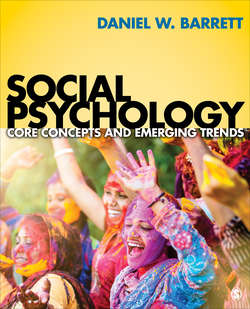Читать книгу Social Psychology - Daniel W. Barrett - Страница 34
На сайте Литреса книга снята с продажи.
Morality
ОглавлениеOne of the questions that my students love to discuss (but have a difficult time resolving) is whether or not pure altruism exists. Pure altruism occurs when a person helps another in a completely selfless way and derives absolutely no benefit from helping (Batson, Ahmad, & Stocks, 2011; Newman & Cain, 2014). Students offer compelling arguments on both sides of the issue. One student may say, for instance, that altruism must exist, because how else can we explain the actions of a firefighter who loses her life while heroically trying to save an unknown child? Typically, another responds that the firefighter did not expect to die and, had she lived, would have benefited, because helping makes us feel good. At the same time, still others wonder how we can even speak of human goodness when there have been so many instances of mass killing and senseless violence in our history. Some people argue that not only are humans selfish, but we can be downright evil (Miller, 2004a)!
Social psychologists have extensively studied moral behavior in order to understand the factors that lead people to engage in helpful, prosocial behavior versus undesirable, antisocial behavior. In one study, researchers gave young children a chance to “steal” extra candy during Halloween trick-or-treating. How they behaved depended on whether or not they could be personally identified (Diener, Fraser, Beaman, & Kelem, 1976). The kids were much more likely to steal when they thought they were anonymous. As you will see, whether or not a person behaves morally depends on a number of personal and situational factors. Think about a time when you helped someone else. What motivated you? Did you gain some benefit, even a small one?
These six topics—free will, independence, rationality, the self, sociality, and morality—together get at the essence of human nature. Each has served as a launching pad for some of the most exciting and thought-provoking research in social psychology. Although the questions have spurred separate research streams, it is critical to note that these seemingly disparate topics are interconnected in important ways. For instance, the extent to which we believe we have free will is closely tied to our identity or self-concept. Identity, in turn, is connected to our sociality through the groups to which we belong and the people with whom we associate. Furthermore, the types of groups that we join and the strength of our bonds with those groups impact the extent to which we are independent or conforming. Moreover, our ability to develop and maintain friendships is partially dependent on how we treat others, either morally or immorally. These examples illustrate the myriad of interrelationships among the six questions. It is easy to see, then, how social psychological science is grounded in fundamental questions about human nature. Let’s turn our attention to the historical development of social psychology.
